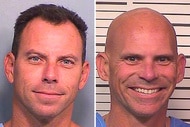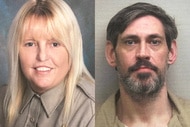Create a free profile to get unlimited access to exclusive videos, breaking news, sweepstakes, and more!
Accused Cold Case Rapist Released From California Jail Due To Coronavirus Concerns, Sparking Police Outrage
Gregory Vien is alleged to have sexually assaulted two women in 1997, but wasn't arrested until a DNA match in 2019. Local officials have criticized a judge's decision to release him to home confinement.

A California man who was arrested last year for multiple sexual assaults that had gone unsolved for decades was released from custody late last month due to coronavirus (COVID-19) concerns, sparking outrage from police, prosecutors, and the local mayor.
Gregory Vien, 60, was arrested in November in connection to multiple sexual assaults that occurred in the Livermore and Union City area in 1997, the Union City Police Department announced last year. Investigators with the UCPD and the Livermore Police Department credited genetic genealogy and DNA testing as the key factors leading to Vien’s identification as a suspect; it was after testing his DNA, retrieved from a discarded ice cream spoon, that they were able to identify him as a match.
However, Vien, who is currently awaiting trial, was released alongside more than 800 other inmates from the Santa Rita Jail in an effort to reduce the spread of the coronavirus, police said. Alameda County Superior Court Judge Thomas Reardon made the decision to reduce Vien’s bail from $2.5 million to zero dollars, effectively securing his release, UCPD explained in a recent news release. He has been ordered to wear an ankle bracelet to monitor his location until he next appears in court. He is also barred from leaving his home aside from traveling to court hearings and meetings with his legal team, according to CBS San Francisco.
Vien, who was released on Friday evening, faces charges related to two alleged sexual assaults, including three counts of sexual penetration by a foreign object and two counts of forcible oral copulation, CBS San Francisco reports. He is alleged to have first targeted a woman who was heading to a train station on May 6, 1997, forcing her to go with him to a deserted area where he sexually assaulted her; he is then alleged to have victimized another young woman on Sept. 15, 1997, attacking her while she was out for a walk, according to the outlet.
Although DNA was collected from both scenes and found to be a match to each other, it was not until decades later, in 2019, that authorities were able to use genetic genealogy to identify blood relatives of the suspect, which eventually led them to Vien as a suspect, the New York Daily News reports. Investigators later used a discarded Baskin-Robbins spoon to test Vien’s DNA and link him to both assaults, according to the outlet.
Following his arrest, Vien, who is suspected of committing three other sexual assaults, entered a not guilty plea, Patch.com reports. He was released after his lawyer successfully argued that he has health conditions that make him more likely to die were he to contract the coronavirus in jail, according to CBS San Francisco.
Law enforcement officials, as well as prosecutors, have publicly criticized the judge’s decision to release Vien.
“The Union City Police Department wanted to share this information with our community and let you know that we, like Livermore PD and the District Attorney's Office, do not support this decision and feel it places our communities at greater risk,” the UCPD wrote in their statement announcing Vien’s release.
District Attorney Nancy O’Malley also spoke out against Vien’s release, telling CBS San Francisco, “We argued vehemently against his release, and we are strongly opposed to releasing people charged with serious and violent felonies such as rape and sexual assault.”
Livermore Mayor John Marchand voiced his disapproval in a letter sent to Gov. Gavin Newsom and other state officials, The Mercury News reports. In it, he accused Judge Reardon of being “more concerned about the safety of a suspected rapist than the safety of our community.”
“His priorities are poorly aligned,” Marchand’s letter reads.
Judge Reardon has not responded to the outlet’s request for comment, but Vien’s lawyer, Melissa Adams, said in a statement that Vien has been threatened following news of his release.
“There is more to this case than DNA, and there is still much work to be done,” her statement reads, in part. “Thankfully, in this country we do not convict people based on news articles or allegations or personal feelings about certain types of offenses. There is a process in place to determine guilt or innocence of criminal charges, and that process must be upheld.”























